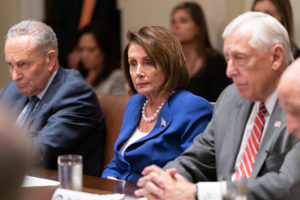
Democrats in Congress are writing up some of the biggest tax increases in history, but not before making sure they protect their friends with loopholes and carve-outs. If they really want to soak the rich, why isn’t taxing municipal bonds, which are the exclusive province of the wealthy, on the table? The tax rate on muni bond interest is 0%. The existing tax rate on capital gains for high-income investors is 23.4%. The Wall Street Journal examines Democrats’ actions, writing:
The House Ways and Means Committee section of the $3.5 trillion tax and spending bill includes myriad tax carve-outs and credits for liberal special interests. Drawing particular attention from the wealthy in Greenwich and Silicon Valley is an exemption for municipal bonds from a 3% income-tax surcharge.
The proposed 3% surcharge applies to modified adjusted gross income (MAGI) above $5 million a year. A taxpayer’s MAGI includes some deductions that are excluded from AGI such as tax-exempt interest for municipal bonds. The IRS uses MAGI rather than AGI to determine a taxpayer’s eligibility for several deductions, including IRA contributions.
Democrats are applying the 3% surcharge to MAGI to capture more of high earners’ income and limit tax arbitrage. So a taxpayer with an AGI well below $5 million could get soaked. Yet the bill carves out interest from muni debt from MAGI so that states and cities don’t get caught in the backwash.
Many high earners use muni bonds to avoid taxes. Muni bonds are especially valuable in states with high income-tax rates like California and New York because they are also exempt from state and local taxes. Investors have poured into muni bond funds this year as Democrats have threatened enormous tax increases. This has pushed down muni-bond yields to record lows and reduced borrowing costs for states and cities. The S&P muni-bond index was yielding a mere 1.07% on Friday.
State and local governments raised alarms that the 3% surcharge, if applied to interest on municipal bonds, could reduce their value to investors and raise borrowing costs. Suddenly, California and New York might have to pay more to fund their bloated governments.
“We were concerned that this proposal, if implemented, could impact tax-exempt interest as well, and would be bearish for municipals,” Citigroup explained in a research note last week. “However, based on feedback from tax experts and Ways and Means Committee staff, we now believe that the 3% surcharge will not apply to tax-exempt interest.” Sighs of relief all around in Albany, Springfield—and the Goldman Sachs executive floor.
The surcharge will raise the top marginal income-tax rate to 46.4%, including the 3.8% net investment tax. Add state and local taxes and the wealthy in Silicon Valley and New York could pay some 60% of their income in taxes. But they will pay nothing on munis. Some tax avoidance schemes are apparently more equal than others.
Read more here.



